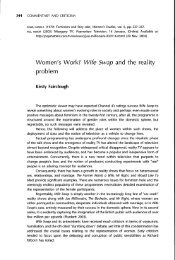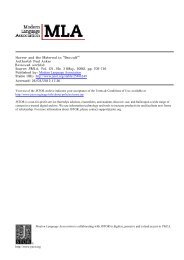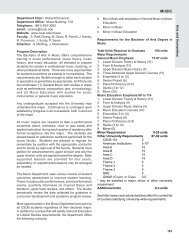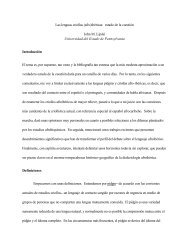''Don't Ask me, I'm Just a Girl'': Feminism, Female Identity, and The ...
''Don't Ask me, I'm Just a Girl'': Feminism, Female Identity, and The ...
''Don't Ask me, I'm Just a Girl'': Feminism, Female Identity, and The ...
You also want an ePaper? Increase the reach of your titles
YUMPU automatically turns print PDFs into web optimized ePapers that Google loves.
Don’t <strong>Ask</strong> <strong>me</strong>, I’m <strong>Just</strong> a Girl 297<br />
collection,’’ shouts ‘‘But she’s got a new hat!’’ <strong>and</strong> that’s all it takes<br />
for the crowd to surge forward, claim their Malibu Stacy dolls, <strong>and</strong><br />
ignore Lisa Lionheart. Lisa sighs <strong>and</strong> sadly concludes, ‘‘I guess you<br />
just can’t beat big business. <strong>The</strong>re’s no room for the little guy.’’ But<br />
just as soon as the words are out of her mouth she hears her own voice<br />
saying ‘‘Trust in yourself <strong>and</strong> you can achieve anything!’’ <strong>and</strong> she turns<br />
to see one little girl st<strong>and</strong>ing before the Lisa Lionheart display, smiling<br />
at the doll. Proudly, Lisa then says ‘‘You know, if we get through to just<br />
that one little girl, it’ll all be worth it.’’ Not content to let liberal<br />
pieties go uncontested, the writers have Lovell quietly say ‘‘Yes, particularly<br />
if that little girl happens to pay $46,000 for that doll.’’<br />
‘‘What?’’ Lisa asks. ‘‘Oh, nothing,’’ Lovell replies. ‘‘Kudos to you, Lisa.<br />
Kudos.’’<br />
Conclusion<br />
How are we to read such an ending? On the one h<strong>and</strong>, this episode is<br />
offering its viewers an image of youthful idealism, can-do individualism,<br />
<strong>and</strong> grass-roots activism in the service of contesting prevailing<br />
ideologies <strong>and</strong> providing alternative ones, an image in accord with the<br />
progressive politics of <strong>The</strong> Simpsons. On the other h<strong>and</strong>, in acknowledging<br />
capitalism <strong>and</strong> the reality of a profit-oriented consu<strong>me</strong>r marketplace,<br />
the episode is also offering a rather pessimistic view of the<br />
ability of individuals (or even small coalitions of individuals) to truly<br />
effect social change. In this regard, the politics of the episode is marked<br />
by an ambiguity that seems to <strong>me</strong> in perfect keeping with the ti<strong>me</strong>s in<br />
which it appeared. <strong>The</strong> 1990s itself was an era of great ambiguity,<br />
epitomized perhaps in the year-long public debate over whether or not<br />
we should care about the private sexual activities of the President of the<br />
United States. More to the point here, the creators of <strong>The</strong> Simpsons seem<br />
to have mixed feelings regarding feminism <strong>and</strong> female identity in the<br />
contemporary age. Ironically enough, considering the largely egalitarian<br />
climate in which <strong>The</strong> Simpsons is both set <strong>and</strong> produced, the show<br />
seems to be, in the words of Lori L<strong>and</strong>ay, ‘‘at a crossroads of reactionary<br />
<strong>and</strong> liberated definitions of femininity’’ (192). So<strong>me</strong> of this can assuredly<br />
be attributed to the fact that <strong>The</strong> Simpsons is, after all, a<br />
mass <strong>me</strong>dia product, produced for <strong>and</strong> marketed to the largest demographic<br />
possible, <strong>and</strong> that, as such, it needs to cater to prevailing

















